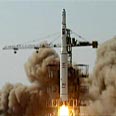
Israel calls for 'strong action' over N. Korea nuclear test
Pyongyang announces that it successfully carried out underground test as part of 'measures to bolster nuclear deterrent for self-defense'; test followed with several missile launches. US President Obama says test a 'grave concern'; Israel 'shares international community's concern'
North Korea announced Monday that it successfully carried out a second underground nuclear test, less than two months after launching a rocket widely believed to be a test of its long-range missile technology.
Just hours later, Pyongyang fired several short-range missiles, South Korea's Yonhap news agency quoted a diplomatic source as saying.
South Korean officials were checking into the Yonhap report that the North fired a surface-to-air missile with a range of about 130 km (80 miles) from its coast Musudan-ri missile range, from which it fired a long-range rocket in April.
Russia's United Nations ambassador Vitaly Churkin was quoted by Itar-Tass news agency as saying that the UN Security Council would meet on Monday to discuss North Korea's nuclear test. Moscow currently holds the rotating monthly presidency of the Security Council.
"Japan made a request to the president of the Security Council that they hold a Security Council meeting on North Korea," said a diplomatic source, asking not to be identified.
North Korea, incensed by UN Security Council condemnation of its April 5 rocket launch, had warned last month that it would restart it rogue nuclear program, conduct a second atomic test as a follow-up to its first one in 2006, and carry out long-range missile tests.
On Monday, the country's official Korean Central News Agency said the regime "successfully conducted one more underground nuclear test on May 25 as part of measures to bolster its nuclear deterrent for self-defense."
The regime boasted that the test was conducted "on a new higher level in terms of its explosive power and technology of its control."
South Korean President Lee Myung-bak convened an emergency security session. His spokesman, Lee Dong-kwan, confirmed that a North Korean nuclear test was possible.
US President Barack Obama said that nuclear and missile tests conducted by North Korea were a "grave concern to all nations" and a legal violation that warranted action by the international community.
"North Korea's attempts to develop nuclear weapons, as well as its ballistic missile program, constitute a threat to international peace and security, Obama said in a statement.
Japan will respond 'in responsible manner'
A Japanese Foreign Ministry spokesman said his country would respond to North Korea's nuclear test "in a responsible fashion" at the United Nations.
"We are now aware of the news that the DPRK (North Korea) conducted a nuclear test for the second time, so we are certainly going to respond in a very responsible manner," said Kazuo Kodama on the sidelines of a regional meeting in Vietnam. "Definitely we are going to respond, we have to, at the UN Security Council."
Seismologists from the US, South Korea and Japan reported activity shortly after 9:50 a.m. in a northeastern area where North Korea conducted its first nuclear test in 2006.
The Japan Meteorological Agency measured the seismic activity at magnitude-5.3. Quake expert Gen Aoki noted that its depth was "very shallow."
"The area is not active seismically so it is highly possible that it could be an artificial quake," Aoki said in Tokyo.
In Seoul, the Korea Institute of Geoscience and Mineral Resources reported seismic activity in Kilju in North Hamgyong Province - the same area where North Korea carried out a nuclear test in October 2006.
Seismological measurements back North Korea's claim that the test was far stronger than in 2006.
At the Chinese border city of Yanji, 130 miles (200 kilometers) northwest from the test site, an emergency siren sounded shortly before 9 a.m. when officials thought an earthquake occurred. A receptionist at Yanji's International Hotel said she and several hotel guests felt the ground tremble.
An official at Yanji's government seismological bureau, who declined to give his name, said his agency confirmed that some type of explosion occurred, "but it is hard to say what kind of blast it was."
North Korea's 2006 test measured magnitude-3.6, an official at the Korea Meteorological Administration in Seoul said. He spoke on condition of anonymity, citing department policy.
Previous test drew widespread condemnation
Monday's test raises the stakes in North Korea's standoff over its nuclear and missile programs.
North Korea conducted its first nuclear test in October 2006, drawing widespread international condemnation and drawing stiff sanctions from the UN Security Council.
The Security Council demanded that North Korea eliminate its nuclear weapons and ordered countries to prevent Pyongyang from importing or exporting any material for weapons of mass destruction or ballistic missiles.
The surprise nuclear test prompted five nations to pressure the North to agree to dismantle its nuclear program in exchange for energy aid and other concessions - a pact Pyongyang signed in February 2007. North Korea began disablement in November 2007.
That process came to a halt in July 2008.
South Korean troops were on a high alert but there was no sign North Korean troops were amassed along the heavily fortified border dividing the two Koreas, according to an official at the Joint Chiefs of Staff who spoke on condition of anonymity, citing agency policy.
North Korea is believed to have at least a half-dozen atomic bombs. However, experts say North Korean scientists have not yet mastered the miniaturization technology for mounting a nuclear device onto a long-range missile.
The Israeli Foreign Ministry expressed its concern over the test: "Israel shares the international community's concerns regarding this test. Especially considering the negative implication it may carry as far as our region is concerned. We expect the international community to take strong action in order to send a message to other nations," said the Foreign Ministry in a statement.
Roni Sofer, the Associated Press and Reuters contributed to this report










